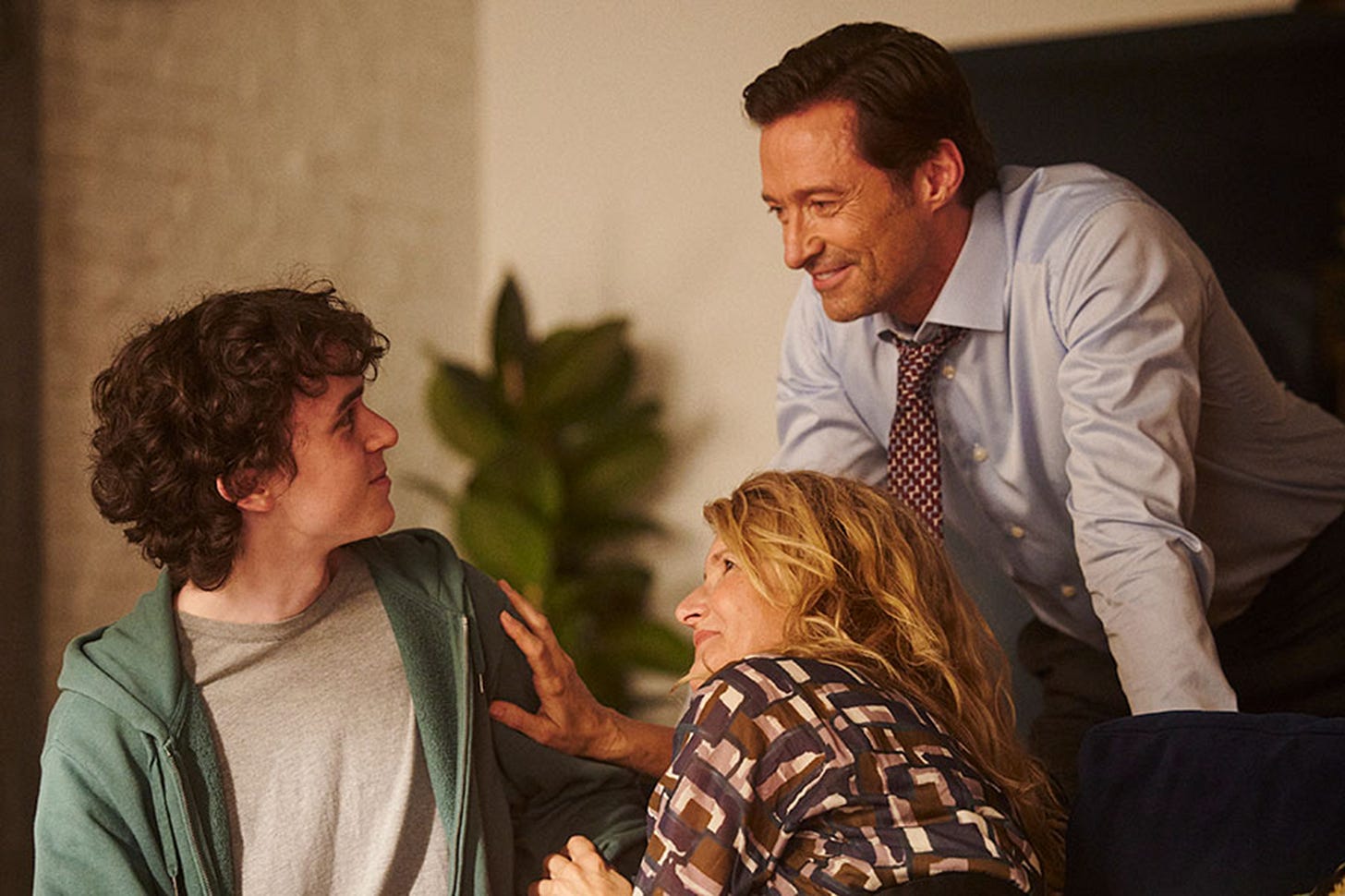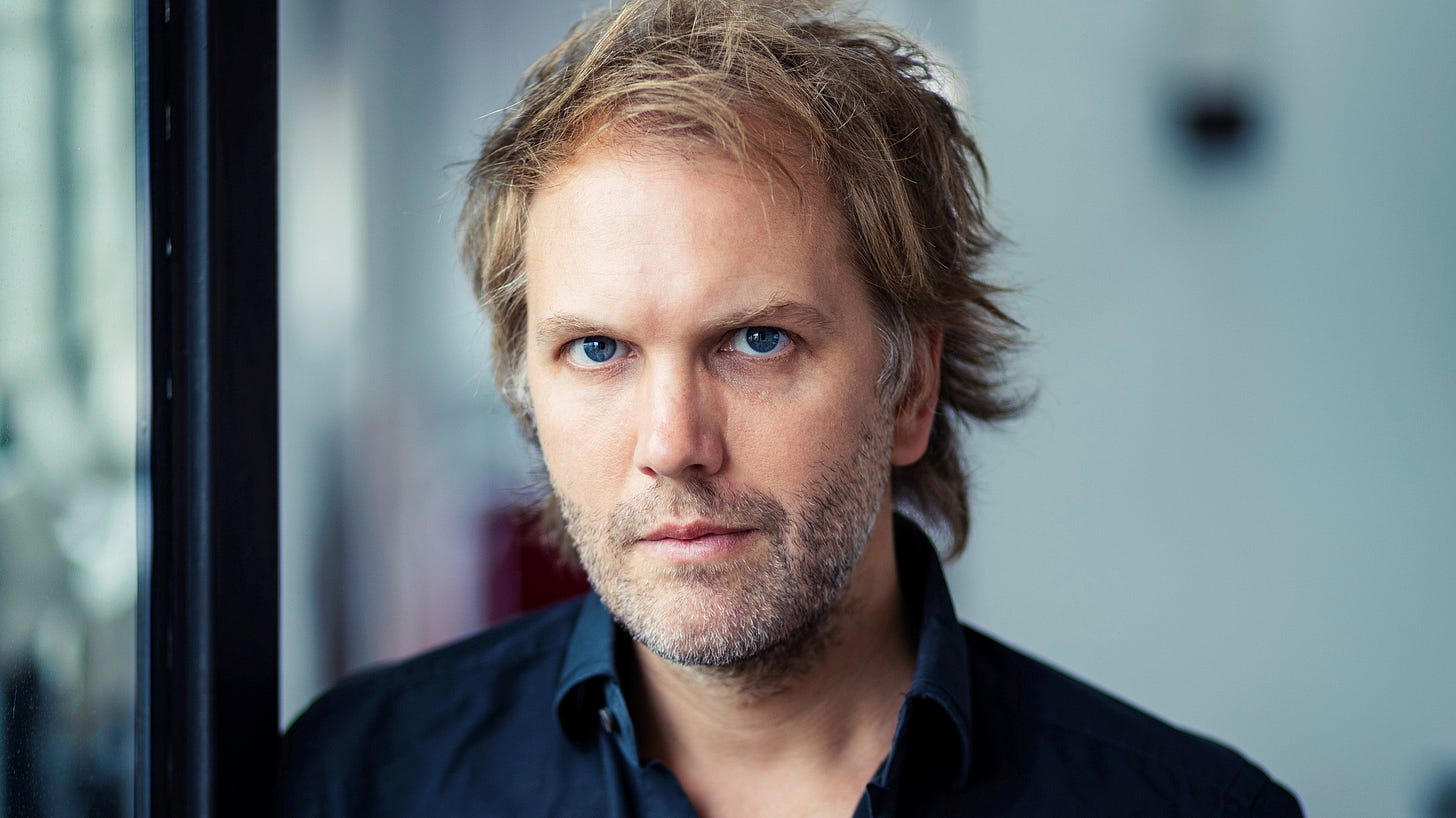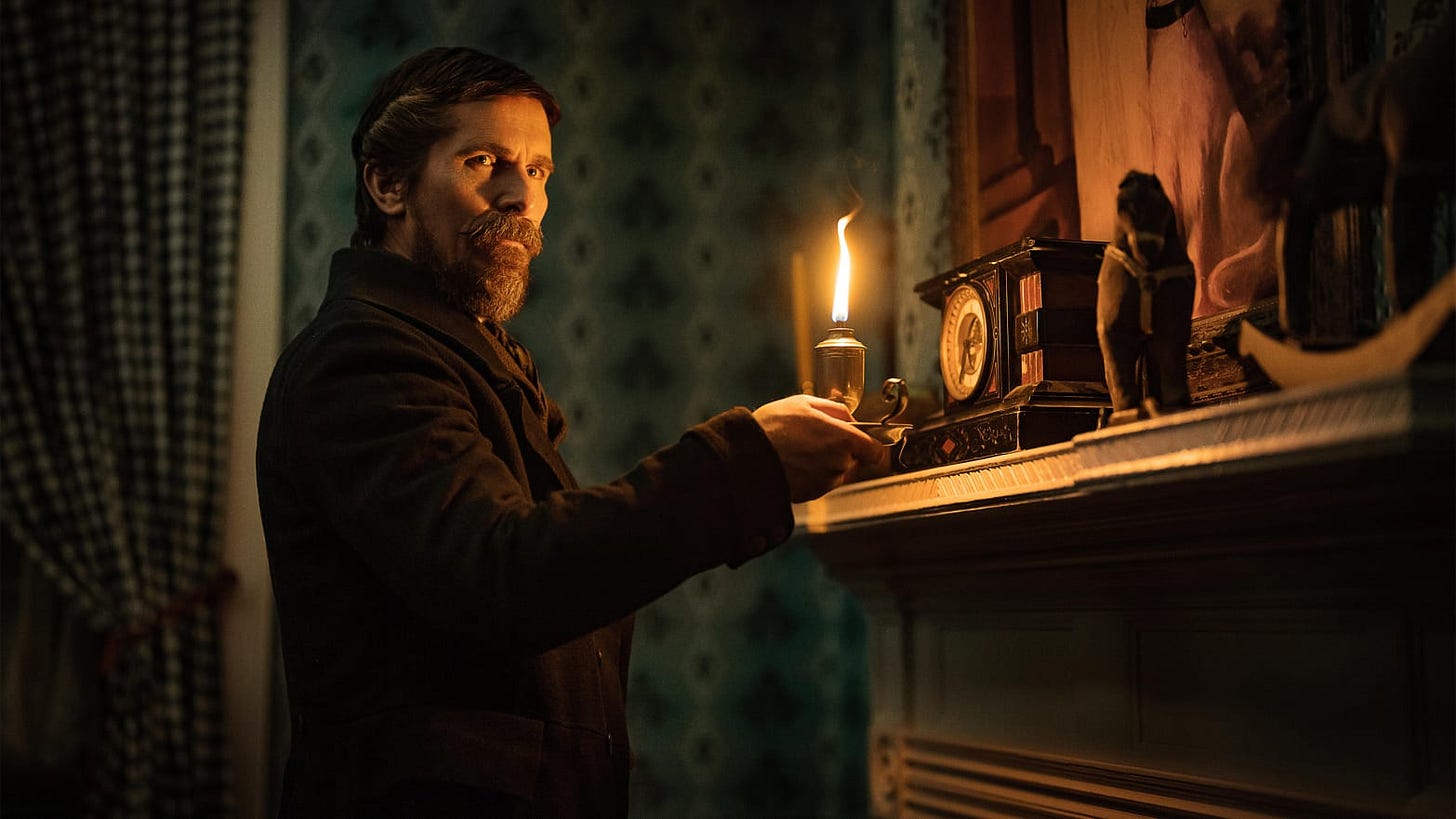Coming Apart
Reviews of The Son, The Pale Blue Eye, and Aftersun
I. The Son - Phony Baloney
Florian Zeller’s latest picture, The Son, chronicles the descent of a depressed teenager named Nicholas into suicide, and by the end you may wish to join him. It’s hard to believe the movie emanated from the same director who made The Father two years ago. That film, riding on a tour de force from Anthony Hopkins, gave you the felt experience of a mind falling apart under dementia. Zeller achieved this phenomenological effect by merging theater of the absurd with realism: i.e., the scenes are filmed realistically, but they’re edited together to induce a sense of madness. Like its title character, you can never tell what’s actually happening and what’s a mental trick. You share his horror and desperation at the loss of lucidity as he spirals.
Zeller sets up The Son for a similar approach, but falls on his face. Despite the title, the movie’s told from the point of view of Nicholas’s dad, Peter (Hugh Jackman), who works as a midtown executive to support his second wife, Beth (Vanessa Kirby), and their newborn. Nicholas (Zen McGrath) is the product of his first marriage and lives with Peter’s ex, Kate (Laura Dern). Kate shows up at Peter’s sleek, modernist apartment one day at her wits end: Nicholas, she’s learned, hasn’t attended school for a month, instead wandering the streets in a funk. She hints at conflict with the gloomy boy, and Peter decides to take him in after Nicholas says he can’t stand it with mom.
The rest of the movie charts the fallout. Peter puts Nicholas in a new school and psychotherapy, thinking things will improve. But then Beth finds a knife under the kid’s pillow and Peter discovers he’s still playing hooky. A series of ham-fisted confrontations ensue, in which dad fails to understand what’s eating his son, leading the latter to slice his wrist (he’d been self-harming before as well). He’s admitted to a psych hospital, but this only makes matters worse, as he demands his parents free him from the hellhole against the dire warnings of the doctors. What will they do?
It’s not hard to guess, oppressed as you are by ominous music and glaring giveaways. The film is a dirge, marching you to its inevitable conclusion. The director goes for tragedy, but what he achieves is a farce, since nothing and no one makes sense. Nicholas’s parents are affluent professionals in Manhattan, yet they act as if they’ve never heard of mental illness. Their reactions to their son’s mood seem ripped from social problem films of the ‘40s or ‘50s, before depression became a household word. Zeller would honestly have us think that parents in 2022 wouldn’t know about the national epidemic of teen angst. Every kid in America’s on behavioral meds for something, and New York’s the therapy capital of the world. But Peter walks through the film first oblivious, then in denial, and finally crushed by the unspeakable blow: His son’s sad!
The picture’s so blunt it feels like a well-made play, in which you prepare for the revelation of some shattering secret. But Zeller keeps hitting you with the same obvious point: Nicholas is depressed. You can’t believe that’s all there is, though. So when Kate tells Peter the boy has a scary look in his eye or isn’t “like other kids,” you wonder what sinister truth you’re in for. Is he killing cats? Sleeping with mom? Possessed by demons? In one bizarre montage, Nicholas stares out slowly in class as Zeller cuts to Kate doing the same thing at work. This is outdone only later when Zeller pans to the brooding boy while Peter and Beth have an impromptu dance party. Other moments suggest mom and son are in league either to exact revenge on Peter or steal him back from the homewrecker Beth. The boy walks in on her getting it on with his dad in the living room (who’d attempt that when your adolescent son’s down the hall?) and later pointedly questions her why she broke up Peter’s marriage. When he sneaks into his half-brother’s bedroom later and inspects his crib, your stomach churns.
But no devious device is sprung, except the trap Zeller throws the audience into when Nicholas is at hospital. During this reprehensible scene, the medical staff are repeatedly interrupted from explaining the boy’s condition to his bewildered parents (which, I can tell you from personal experience, would never happen), then force Peter and Kate to choose—as he screeches in front of them—whether to release the boy or continue his confinement. Such emotional manipulation makes you want to swing at Zeller the way the son swings at them after they assent to the doctor’s heavy-handed will. The guilt the doc lays on them is overcome only by the shame they feel in betraying the boy, prompting them to change course. Somehow, Nicholas is released without a phone call to his shrink, a discharge plan to a partial program, or instructions to remove any weapons from his home. You’d think Peter would do this anyway, given that Nicholas asks midway through the picture about the rifle his dad keeps in the laundry room. And because, you know, he cuts himself. Zeller clearly didn’t consult with anyone in the mental health field or an actual patient.
Nicholas is a mere prop, given neither personality nor interior life. Even depressed kids have hobbies, but Nicholas has zero friends and no interests. As for his therapy, we get one shot of him with his doctor, who disappears for the rest of the film, along with any report of what’s come of their sessions. We never even see what the boy does all day when skipping class. Nicholas keeps pleading to his dad to understand his pain, but Zeller fails to give the audience the felt experience of depression that eludes Peter (and which the director achieved with dementia in The Father). And are we really supposed to buy that the school wouldn’t call his folks on the phone? Or reply to the fake email Nicholas sends from his dad’s account? Or request a parent-teacher conference with Peter? How did any of this melodramatic bunk get past the team at Sony, let alone test audiences?
Meanwhile, the empty dialogue and misdirection leave the cast out on a limb. Only Dern, with her emotional purity, escapes unscathed—barely. Zeller makes painful asks of McGrath; no one would look good in his shoes. Kirby, terrific in The Crown and elsewhere, is wasted here. As for Jackman, he oscillates between two registers: clueless smiles and blunt anger. The Australian can be effective in parts where his charm and physicality befit the character, such as Gary Hart in The Front Runner (2018). But he has no depths, and his attempts to reveal them at the climactic moments are excruciating. Zeller makes a stab at exploring the family origins of Nicholas’s illness, as Peter has a disastrous visit with his own father while on business in D.C. Hopkins plays the elder, temporarily bringing some spark to the film. But he savages Peter so brusquely and inexplicably you throw up your hands. Peter’s left moaning on the floor at the film’s close, but it might as well be you—and not for the reasons Zeller intends. The Son wouldn’t sell if it were on Afterschool Special.
II. The Pale Blue Eye - The Poet as Sleuth
Writer/director Scott Cooper bolted out of the gate with his first film, Crazy Heart (2009), a beautiful portrait of a country music legend (Jeff Bridges) looking for redemption. His subsequent movies—Out of the Furnace (2013), Black Mass (2015), Hostiles (2017)— have been brutal, off-putting affairs, but he returns to form with The Pale Blue Eye, a murder mystery set at West Point in 1830. Based on a 2003 novel by Louis Bayard, the picture stars Christian Bale as Augustus Landor, a retired detective who lives in a cottage near the military academy. He’s summoned to the institution to investigate the death of Cadet Leroy Fry, found hanging from a tree near the campus in the dead of night. On top of his grisly demise, his heart was removed post-mortem. Landor inspects the corpse in the presence of the academy’s Dr. Daniel Marquis (Toby Jones), and discovers a note with sentence fragments clutched in Fry’s hand.
To crack the case, Landor enlists the aid of another cadet, one Edgar Allan Poe (Harry Melling), whose tells him that only a poet could deduce the cryptic writing. The two of them are inducted into the shadow side of the academy, as Poe infiltrates a nocturnal circle of cadets who meet for cards and conspiracy. This—combined with discoveries of ritually slain animals and another heartless cadaver—makes Landor and Poe suspect a cult. Meanwhile, Poe becomes enamored of Marquis’s daughter, Lea (Lucy Boynton), whose cadet brother, Artemus (Harry Lawtey), is part of the secretive sect. Lea suffers from seizures, and Poe senses some unnatural cause at work.
Cooper and his team create a rich, Gothic design for the film that realizes the atmosphere of Poe’s works. Fog, woods, and blue earth tones lend the picture a haunted texture, and those familiar with Poe’s poems and stories will take pleasure in spotting the literary references throughout. As Landor, Bale turns in a measured, focused performance, at times forced. Gillian Anderson overacts again as Julia Marquis, the doctor’s wife, and Robert Duvall arrests you as a wizardly mentor of Landor’s who instructs him in the history of the occult. But the movie belongs to Melling, of Harry Potter fame. His Poe is eccentric and peculiar, channeling the writer’s Romantic melancholy and fascination with the macabre. He lights up his every scene, especially when he orates poetry for Lea. The other cadets find him queer, witty, and threatening by turns, and he makes for a good foil for the earnest Landor. It’s an imaginative, inventive, artful performance.
Unfortunately, the movie falls apart in the third act, its expected big reveal a dud that’s contrived and deflating. It turns away from its ghostly, satanic elements precisely when you want more of them—something Poe himself would’ve known. But for three-fourths of its run time, it draws you in.
III. Aftersun - Burn Marks
Aftersun makes for the debut of Scottish director Charlotte Wells, and it stirs up complex emotions. A two-hander in essence, it depicts an eleven-year old Scottish girl named Sophie (Frankie Corio) during a vacation with her dad, Calum (Paul Mescal), at a Turkish resort. The movie, set in the late ‘90s, falls most closely in the coming-of-age genre, though it works like a memory movie. This comes through in its point of view—entirely that of Sophie—and editing. Wells sets up many of her shots asymmetrically, with the point of focus occurring at the margins of the frame or even off-camera. Images float and merge like wisps of clouds, achieving a visual poetry that complements the quiet ambiance. Later, the images fade into those of an adult Sophie, who ruminates on her remembered vacation with a pensive visage.
Gradually we come to realize that the trip was the last time she saw her father. We’re never told why; the picture ends with what turns out to be the final image of the man. But Wells leaves hints throughout of a troubled soul. In bits and pieces we hear of Calum’s job and money problems, and he’s divorced from Sophie’s mom, a burden that he struggles to explain. At one point he even confesses to a scuba instructor that he doesn’t expect to live to 40. What comes through is a portrait of a young father trying to keep demons at bay by making fun memories for his daughter. But his mood leaks out of his tragic smile, Sophie picking up on a deep sadness that she struggles to comprehend.
The film’s impressionistic in this way, befitting the mind of a child. Still, the girl’s precocious and self-reliant. After Calum goes out one night while she’s hanging with a boy, she has to track down management to let her in their room, only to find her dad passed out naked in a drunken stupor. And when he says he’ll treat her to singing lessons, she curtly tells him not to make promises she knows he can’t afford. She’s at once dimly aware of adult woes, yet preternaturally perceptive of his condition. Meanwhile, we see hints of her initiation into maturity as she socializes with teens at the resort. Wells draws out the sensual element of their horseplay in the pool, the curiosity Sophie evinces towards the older kids’ drinking and nascent sexuality.
The film features a stripped-down narrative that would leave you wanting but for Mescal’s tender performance. The picture rides on him. Through the subtlest inflections of voice and body, he reveals a sea of churning emotion inside the soft exterior. You get the sense of a man laboring with all his might to hold himself together and hide the truth of his despair from his child. In one mesmeric image, we see him practicing Tai chi on the balcony at night while he smokes. Self-help and meditation books adorn the shelves, too. In one shot, he weeps alone in their room, waves of sorrow cascading through his skin.
Calum seeks escape from his pain in the idyll of the scene, drawn to a Turkish rug for its beauty even as it breaks the bank to buy. You see how Sophie’s emergence out of childish innocence into adolescence upsets him, the vicarious wonder at the world she afforded him fading away. This leads to uneven responses from him—he refuses to sing their favorite karaoke song (R.E.M.’s “Losing My Religion”) on stage even as she begs, but later insists she join him on the dance floor for Queen and Bowie’s “Under Pressure,” both songs channeling Calum’s sense of coming apart. Sophie tries to cheer him up, getting fellow tourists at an outdoor spa to sing him “Happy Birthday.” But this only seems to depress him more, evoking the story he tells her of his eleventh birthday, which his parents forgot.
Aftersun calls to mind the 2002 memory movie In America by Irishman Jim Sheridan, and Sofia Coppola’s Somewhere (2010). Both films depict daughters who, wise beyond their years, attempt to reach and rescue fathers in the throws of life quakes. Aftersun gives us less clarity about the source of those crises, working as it does by mood and imagery. But Calum’s inscrutability and, by extension, the world’s, accrues over time. The adult Sophie reaches backwards through memory and video of the trip to understand the father she never knew and never saw again. But she can’t, images of Calum flickering by in her mind, lit by a strobe light as he dances. We can’t know either, in the end, the iceberg effect at work throughout. In its allusiveness, irresolution, and portrait of a life led in quiet desperation, Aftersun lingers in the mind.









